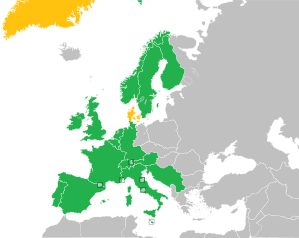Eurovision Song Contest 1971
| Eurovision Song Contest 1971 | |
|---|---|
 |
|
| Dates | |
| Final | 3 April 1971 |
| Host | |
| Venue |
Gaiety Theatre Dublin, Ireland |
| Presenter(s) | Bernadette Ní Ghallchóir |
| Conductor | Colman Pearce |
| Director | Tom McGrath |
| Executive supervisor | Clifford Brown |
| Host broadcaster | Raidió Teilifís Éireann (RTÉ) |
| Interval act | Bunratty Castle Entertainers |
| Participants | |
| Number of entries | 18 |
| Debuting countries |
|
| Returning countries | |
| Withdrawing countries | None |
| Vote | |
| Voting system | Each country had two jury members, one aged between 16 and 25 and another aged between 26 and 55. They each awarded 1 to 5 points for each song immediately after it was performed (other than the song from their own country) and the votes were collected and counted as soon as they were cast. The juries watched the show on TV from a backstage area of the theatre and then appeared on stage to confirm their scores. |
| Nul points | None |
| Winning song |
"Un banc, un arbre, une rue" |
The Eurovision Song Contest 1971 was the sixteenth edition of the annual Eurovision Song Contest. It was held in Dublin, Ireland on 3 April 1971.
Monaco's win was their first and only victory. The song was performed by a French singer, living in France, sung in French, conducted by a French native and written by a French team. Séverine later claimed she never visited Monaco before or after her victory – a claim easily disproved by the preview video submitted by Télé-Monte-Carlo featuring the singer on location in the Principality.
The contest was held at the Gaiety Theatre in Dublin, the capital and most populous city of Ireland. This was the first time that the contest was held in Ireland.
For the first time, each participating broadcaster was required to televise all the songs in "previews" prior to the live final. Belgium's preview video featured Nicole & Hugo performing the song "Goeiemorgen, morgen", but Nicole was struck with a sudden illness days before the contest final, with Jacques Raymond & Lily Castel stepping in at short notice to perform the entry in their place. Reports suggested that Castel had not even had enough time to buy a suitable dress for the show.
The BBC were worried about the possible audience reaction to the UK song due to the hostilities raging in Northern Ireland. They specifically selected a singer from Northern Ireland, Clodagh Rodgers, who was popular in both the UK and the Republic of Ireland, to ease any ill-feeling from the Dublin audience. However, Rodgers still received death threats from the IRA for representing the UK.
...
Wikipedia


